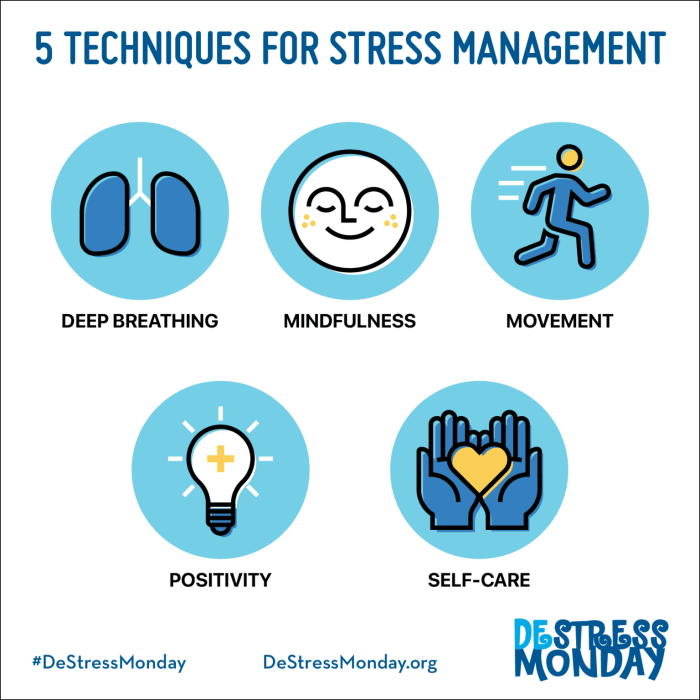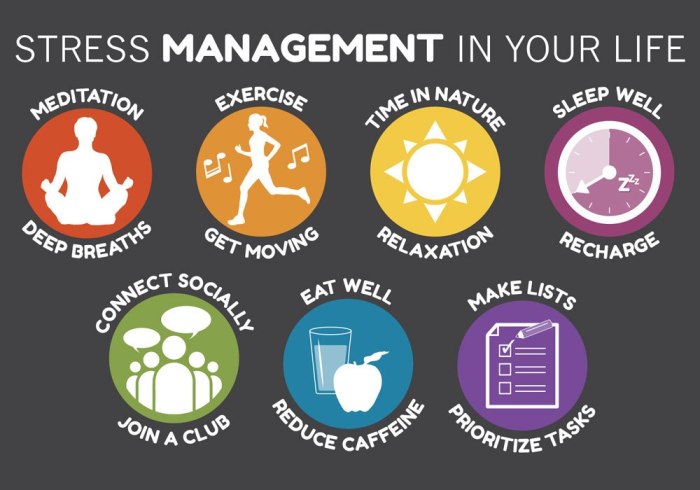Stress Management Tips kick off this guide, diving into the importance of managing stress in daily life, why it’s crucial for mental and physical well-being, and how it can enhance overall quality of life.
Healthy Lifestyle Habits, Relaxation Techniques, and Time Management Strategies are all covered to help you conquer stress like a boss.
Introduction to Stress Management Tips

Stress is a common part of daily life, but learning how to manage it effectively is crucial for our mental and physical well-being. When left unchecked, stress can take a toll on our health and overall quality of life. By implementing stress management tips, we can navigate through challenging situations with more ease and maintain a sense of balance in our lives.
The Impact of Stress Management
- Reduced risk of chronic health conditions such as heart disease and high blood pressure
- Improved mental clarity and focus
- Enhanced emotional well-being and resilience
- Better sleep quality and overall energy levels
Healthy Lifestyle Habits for Stress Management

Incorporating healthy lifestyle habits is crucial for effectively managing stress. By focusing on regular exercise, a balanced diet, and adequate sleep, you can significantly reduce stress levels and improve overall well-being.
Regular Exercise as a Stress Management Technique
Regular exercise is a powerful stress-reliever as it helps release endorphins, which are known as the body’s natural feel-good chemicals. Engaging in physical activity such as jogging, yoga, or dancing can help reduce stress, improve mood, and increase energy levels.
Role of a Balanced Diet in Reducing Stress Levels
Maintaining a balanced diet rich in fruits, vegetables, whole grains, and lean proteins is essential for stress management. Certain nutrients like omega-3 fatty acids, magnesium, and vitamin C have been linked to reducing stress and anxiety levels. Avoiding excessive caffeine, sugar, and processed foods can also help stabilize mood and energy levels.
Benefits of Getting Adequate Sleep for Stress Relief, Stress Management Tips
Adequate sleep is crucial for the body to recover and recharge, especially when dealing with stress. Lack of sleep can exacerbate stress levels and lead to irritability, poor concentration, and weakened immune function. Aim for 7-9 hours of quality sleep each night to promote relaxation and overall well-being.
Relaxation Techniques for Stress Relief
Mindfulness is the practice of being fully present and aware of your thoughts, feelings, and sensations in the present moment without judgment. It plays a crucial role in stress reduction by helping individuals acknowledge and accept their emotions, leading to a more balanced and calm state of mind.
Benefits of Deep Breathing Exercises
Deep breathing exercises are a powerful tool for managing stress as they help activate the body’s relaxation response. By taking slow, deep breaths, you can lower your heart rate, reduce blood pressure, and increase oxygen flow to your brain, promoting a sense of calmness and clarity.
- Deep breathing can be done anywhere and anytime, making it a convenient stress-relief technique.
- It helps improve focus and concentration by bringing your attention back to the present moment.
- Regular practice of deep breathing exercises can enhance overall emotional well-being and reduce anxiety levels.
Progressive Muscle Relaxation Techniques
Progressive muscle relaxation involves tensing and then slowly releasing each muscle group in the body to promote relaxation. This technique can help alleviate physical tension and stress, leading to a feeling of deep relaxation and calm.
- Start by tensing your toes and then relaxing them, moving up through each muscle group in your body.
- Focus on the difference between tension and relaxation in each muscle group to heighten awareness of physical sensations.
- Practice progressive muscle relaxation regularly to reduce muscle tightness, improve sleep quality, and lower stress levels.
Time Management Strategies for Stress Reduction: Stress Management Tips
Effective time management is crucial for reducing stress and increasing productivity. By prioritizing tasks, creating to-do lists, and setting boundaries, you can better manage your time and minimize feelings of overwhelm.
Priority Task Organization
- Start by identifying urgent and important tasks that need immediate attention.
- Delegate or eliminate tasks that are not crucial to free up time for essential activities.
- Break down larger tasks into smaller, more manageable steps to prevent feeling overwhelmed.
Benefits of To-Do Lists and Schedules
- Writing down tasks helps clear your mind and allows you to focus on completing them one at a time.
- Setting deadlines for each task on your to-do list can increase motivation and prevent procrastination.
- Following a schedule helps you allocate time for work, rest, and leisure activities, promoting a balanced lifestyle.
Setting Boundaries for Effective Time Management
- Learn to say no to tasks or commitments that will stretch you too thin or compromise your well-being.
- Establish specific work hours and designate time for relaxation and self-care to prevent burnout.
- Avoid multitasking and focus on one task at a time to improve efficiency and reduce stress levels.
